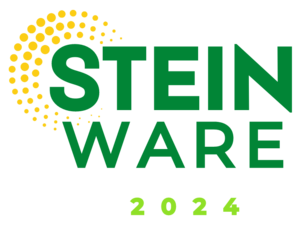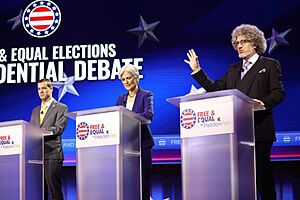Jill Stein 2024 presidential campaign facts for kids
Quick facts for kids Jill Stein for President 2024 |
|
|---|---|
 |
|
| Campaign | 2024 U.S. presidential election 2024 Green primaries |
| Candidate | Jill Stein Physician, 2012 and 2016 Green Party presidential candidate Butch Ware History professor and author |
| Affiliation | Green Party |
| Status | Announced: November 9, 2023 Presumptive nominee: May 26, 2024 Official nominee: August 17, 2024 |
| Receipts | US$2,130,760 (August 31, 2024) |
| Slogan | People, Planet, Peace |
Jill Stein, a doctor from Massachusetts, decided to run for president in the 2024 United States presidential election. She announced her campaign on November 9, 2023. Stein had run for president before, representing the Green Party in 2012 and 2016. In 2012, she received about 470,000 votes. In 2016, she got even more, with 1.46 million votes. This was about 1.1% of all the votes cast.
As of November 3, 2024, polls showed Stein had support from about 0.9% to 1.2% of voters across the country. A survey in August from the Council on American–Islamic Relations found that 29% of Muslim voters planned to vote for her.
Contents
Why Jill Stein Ran for President
In June 2023, Jill Stein first helped with the presidential campaign of Cornel West. He is a well-known activist and scholar. At that time, West was hoping to become the Green Party's candidate.
However, Cornel West later decided to run as an independent candidate instead. After he left the Green Party, Jill Stein started her own campaign. She aimed to become the Green Party's choice for president in November 2023.
What Jill Stein Believes In
When Jill Stein announced she was running, she said that the main two-party political system in the U.S. was "broken." She wanted to focus on important issues for the election.
Her main goals included:
- Helping workers and improving their rights.
- Promoting peace and stopping wars.
- Dealing with the climate emergency.
Stein also often spoke out about how the U.S. handles its relationships with other countries. She especially talked about the Israeli-Palestinian conflict. After some events in October 2023, she criticized actions taken in the Gaza Strip. She also disagreed with President Joe Biden's approach to the situation. She felt he should have done more to stop the violence.
What the Polls Showed
Polling helps us understand what people might do in an election. It's like taking a survey of voters. As of November 3, 2024, Jill Stein's support in national polls was between 0.9% and 1.2%.
A survey in August 2024 by the Council on American-Islamic Relations (CAIR) showed interesting results. It found that 29% of Muslim voters planned to vote for Jill Stein. In the state of Michigan, this support was even higher. About 40% of Muslim voters there supported Stein. For comparison, 18% supported Trump, and 12% supported Harris. CAIR's final poll on November 1 showed that nationwide, 42.3% of Muslims planned to vote for Stein. This was slightly more than those who planned to vote for Harris (41%) or Trump (9.8%).
Her Campaign Journey
Starting the Campaign
On November 9, 2023, Jill Stein officially announced she was running for president for the third time.
Key Moments in the Campaign
Jill Stein took part in a presidential debate on February 29, 2024. This debate was hosted by the Free & Equal Elections Foundation. She debated alongside other candidates from different parties. These included Claudia De la Cruz from the Party for Socialism and Liberation, Jasmine Sherman (another Green candidate), and Chase Oliver and Lars Mapstead from the Libertarian Party.
On April 27, Stein and two of her campaign team members were arrested. This happened at Washington University in St. Louis. They were there to protest the conflict in the Gaza Strip. This protest was part of larger demonstrations happening at universities across the country. Stein later shared that she and the others were held by police until the next morning. She said the university did not respect their freedom of speech.
On May 26, her campaign announced good news. They had gathered enough support from delegates to become the official Green Party candidate.
Some people from the Republican Party seemed to support Stein's campaign. They hoped she would take votes away from Kamala Harris. Stein's campaign paid a company called Accelevate over $100,000. This company helps candidates get their names on the ballot in different states. Accelevate also helped Robert F. Kennedy Jr.'s campaign with ballot access.
On October 24, Stein participated in another debate. This was also hosted by the Free and Equal Elections Foundation. She debated with Chase Oliver and Randall Terry, who was the candidate for the Constitution Party.
Choosing a Running Mate
Jill Stein thought about asking Abdullah Hammoud, the mayor of Dearborn, Michigan, to be her running mate. However, he was too young to become vice president. On August 16, she announced her choice: Rudolph "Butch" Ware. He became her running mate for the election.
Getting on the Ballot
Getting a candidate's name on the ballot in each state can be tricky. The Democratic Party tried to stop Jill Stein from being on the ballot in some states. For example, they filed a lawsuit in Wisconsin. However, the Wisconsin Supreme Court decided not to hear their case. This meant Stein's name stayed on the ballot in Wisconsin.
Stein's campaign also went to the Supreme Court to try and get on the Nevada ballot. The Democrats argued that she would be a "spoiler candidate." This means they thought she would take votes from another candidate, changing the election outcome. The Supreme Court did not agree to hear Stein's case, so she was not on the ballot in Nevada. News reports have talked about how Republicans sometimes try to help third-party candidates like Jill Stein get on the ballot. They believe this might help their own candidates by splitting votes.
Election Results
In the election, Jill Stein and Butch Ware received 764,928 votes. This was about 0.50% of all the votes. This was her second-best result in her three presidential campaigns. It was more votes than she got in 2012 but less than in 2016. This election was also the first time since 2000 that the Green Party finished third in the popular vote.
In Dearborn, Michigan, Jill Stein received 22% of the votes. She came in third place there. Harris received 28%, and Trump received 47%. In important "swing states" (states where the election is very close), Trump won by more votes than Harris and Stein received together. This means Stein's campaign did not change the final outcome in those states.
Her best state for percentage of votes was Maine, where she received 1.09%. She also got over one percent of the vote in Maryland and California.
Images for kids
 | Selma Burke |
 | Pauline Powell Burns |
 | Frederick J. Brown |
 | Robert Blackburn |



